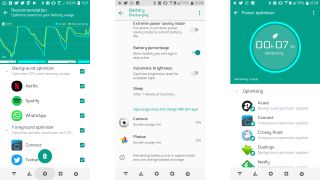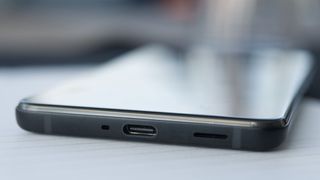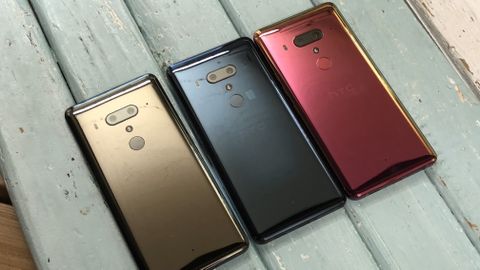Why you can trust TechRadar
- Once again, battery is average
- Keeping a power pack around is handy
- No wireless charging
Oh HTC. Why do you have such a chequered past with battery life, and why has it not been fixed with the U12 Plus?
It feels like we’re writing the same thing over, and over, and over again with this brand. Like iPhones, the battery life on this handset is just a touch too poor to be relied upon every day.
Let’s start with what we think you’ll experience out of the box. After a few days’ use, you’ll find the battery life is a little ‘slippy’, dropping away in standby too easily, despite being a fairly large 3,500 mAh power pack.
Some apps are more to blame than others, like WhatsApp for instance, but overall the phone is a bit too power-hungry.

It’ll heat up a little too often and if you’re multi-tasking hard with it then you’ll find that you’re rarely going to last a day before the battery gives up the ghost, and more often than not you’ll be getting a touch low around 6PM.
Even on Airplane Mode, with Bluetooth music streaming from Spotify, you’ll only get around 23 hours’ use… which is crazy given the WiFi and mobile data aren’t firing.
One thing we do like in the battery screen: information on how much the Bluetooth and WiFi are sucking down power, which will hopefully quell the legions of people that keep turning them off in fear of losing battery.
We ran our usual battery test, looping a Full HD video at full brightness for 90 minutes, and the HTC U12 + lost 23% of the battery, with 77% left (obviously). This isn’t a great performance, with many other flagships on the market hitting late 80s often, and shows how slippy the battery is.

With no wireless charging on board, despite the glass back, it’s harder to top up the phone easily. Sure, we’re not average users as we’ve got wireless charging pads at home and at work (due to testing so many flagships with the capability) but it’s become a really useful feature.
Get to work, pop the phone on a little stand and you’ll go home with full power. Walk into the living room or bedroom and put the phone down on a pad and it’s charging all night. Yes, you can plug in, but the simplicity of wireless charging really is attractive.
You can use the Quick Charge capability to boost in charge easily - we tested this and found we had 40% power from almost dead in half an hour, and 68% after just over an hour’s charging, which is pretty good. Stick the U12 Plus on charge for 15 minutes and you’ll have around 20% juice, which should just get you home.
What gives us a touch more hope that the battery life isn’t going to stay poor is Boost+, the excellent management app from HTC. This program constantly monitors the phone for apps acting out, unnecessary actions needing to be shut down and working out which apps need full power and which don’t.
After a week or two of using the phone, the U12 Plus will intelligently suggest apps that don’t need to run in the background as much, or need all the pixels firing to deliver the same experience.
When these suggestions come in, the app shows you how much battery you could be saving - and if you accept these, each day it’ll tell you how much battery has been saved. We’re getting an hour or so’s battery life back each day, and that’s pretty huge when things are marginal.
We’re not sure that it’s going to do any more than that, but keeping the phone clean and running smoothly in the background is not only useful, but it should preserve the performance of the battery a little over its lifetime.

Gareth has been part of the consumer technology world in a career spanning three decades. He started life as a staff writer on the fledgling TechRadar, and has grown with the site (primarily as phones, tablets and wearables editor) until becoming Global Editor in Chief in 2018. Gareth has written over 4,000 articles for TechRadar, has contributed expert insight to a number of other publications, chaired panels on zeitgeist technologies, presented at the Gadget Show Live as well as representing the brand on TV and radio for multiple channels including Sky, BBC, ITV and Al-Jazeera. Passionate about fitness, he can bore anyone rigid about stress management, sleep tracking, heart rate variance as well as bemoaning something about the latest iPhone, Galaxy or OLED TV.

